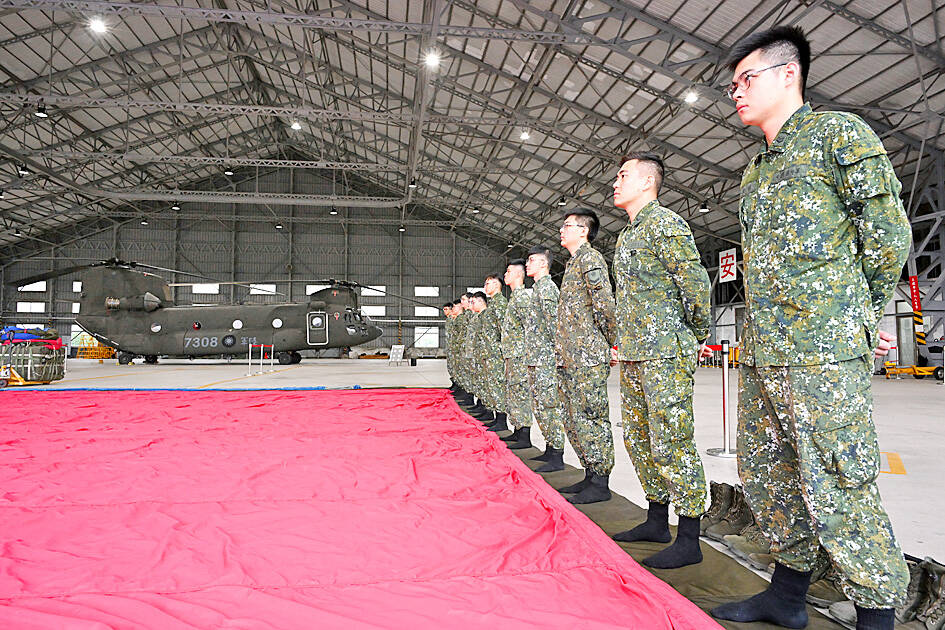The Kaohsiung Branch of the High Court yesterday found retired air force colonel Liu Sheng-shu (劉聖恕) guilty of operating an espionage network for China, handing him a 20-year prison term.
The verdict is subject to appeal.
Five of Liu’s six codefendants — a group consisting mainly of active-duty military officers ranked major to colonel — also received guilty verdicts with sentences ranging from six months to 20 years and six months.

Photo: Tien Yu-hua, Taipei Times
The sentences were some of the heaviest imposed on military service members implicated in espionage-related crimes in the past few years, Chinese-language media reported.
The court said that Liu had contravened the Classified National Security Information Act (國家機密保護法) from 2013 through 2021.
In 2013, Liu visited China on a business trip and was approached by members of Beijing’s intelligence services, who convinced him to collect intelligence on the Taiwanese armed forces, the court said.
Under instructions from his handlers, Liu recruited informants in the nation’s military and stole secrets, while one or more shell corporations were created to disguise payments he received from China, it said.
Military officers compromised in the scheme include a female major surnamed Liu (劉), who was sentenced to 20 years and six months, and a lieutenant colonel surnamed Sun (孫), who was sentenced to 19 years and six months.
A major surnamed Kung (龔) received a sentence of three years and six months, a major surnamed Deng (鄧) was sentenced to two years and a man surnamed Lin (林) received a six-month sentence.
Another major among those indicted, surnamed Liu (劉), was acquitted of all charges.
A major surnamed Cheng (鄭), who was formerly posted at the Songshan Air Force Base in Taipei, which the presidential airplane utilizes, is being tried separately.
Cheng has pled guilty to all charges and was released on bail as he awaits sentencing.
The first trial of a case is typically held at a district court, but the High Court claimed authority over Liu Sheng-shu’s case due to the possibility of classified information being disclosed in court.
In January, the Kaohsiung District Prosecutors’ Office took Liu Sheng-shu and three other officers into custody and placed them in pre-trial detention, while three others were granted bail.
Prosecutors closed the investigation three months later and moved the case to trial.
Kung pled guilty and Cheng’s case was separated at about that time.

INVESTIGATION: The case is the latest instance of a DPP figure being implicated in an espionage network accused of allegedly leaking information to Chinese intelligence Democratic Progressive Party (DPP) member Ho Jen-chieh (何仁傑) was detained and held incommunicado yesterday on suspicion of spying for China during his tenure as assistant to then-minister of foreign affairs Joseph Wu (吳釗燮). The Taipei District Prosecutors’ Office said Ho was implicated during its investigation into alleged spying activities by former Presidential Office consultant Wu Shang-yu (吳尚雨). Prosecutors said there is reason to believe Ho breached the National Security Act (國家安全法) by leaking classified Ministry of Foreign Affairs information to Chinese intelligence. Following interrogation, prosecutors petitioned the Taipei District Court to detain Ho, citing concerns over potential collusion or tampering of evidence. The

NEGOTIATIONS: Taiwan has good relations with Washington and the outlook for the negotiations looks promising, Minister of Economic Affairs J.W. Kuo said Taiwan’s GDP growth this year is expected to decrease by 0.43 to 1.61 percentage points due to the effects of US tariffs, National Development Council (NDC) Minister Paul Liu (劉鏡清) said at a meeting of the legislature’s Economics Committee in Taipei yesterday, citing a preliminary estimate by a private research institution. Taiwan’s economy would be significantly affected by the 32 percent “reciprocal” tariffs slapped by the US, which took effect yesterday, Liu said, adding that GDP growth could fall below 3 percent and potentially even dip below 2 percent to 1.53 percent this year. The council has commissioned another institution

NEGOTIATIONS: The US response to the countermeasures and plans Taiwan presented has been positive, including boosting procurement and investment, the president said Taiwan is included in the first group for trade negotiations with the US, President William Lai (賴清德) said yesterday, as he seeks to shield Taiwanese exporters from a 32 percent tariff. In Washington, US Trade Representative Jamieson Greer said in an interview on Fox News on Thursday that he would speak to his Taiwanese and Israeli counterparts yesterday about tariffs after holding a long discussion with the Vietnamese earlier. US President Donald Trump on Wednesday postponed punishing levies on multiple trade partners, including Taiwan, for three months after trillions of US dollars were wiped off global markets. He has maintained a 10 percent

TRADE: The premier pledged safeguards on ‘Made in Taiwan’ labeling, anti-dumping measures and stricter export controls to strengthen its position in trade talks Products labeled “made in Taiwan” must be genuinely made in Taiwan, Premier Cho Jung-tai (卓榮泰) said yesterday, vowing to enforce strict safeguards against “origin laundering” and initiate anti-dumping investigations to prevent China dumping its products in Taiwan. Cho made the remarks in a discussion session with representatives from industries in Kaohsiung. In response to the US government’s recent announcement of “reciprocal” tariffs on its trading partners, President William Lai (賴清德) and Cho last week began a series of consultations with industry leaders nationwide to gather feedback and address concerns. Taiwanese and US officials held a videoconference on Friday evening to discuss the